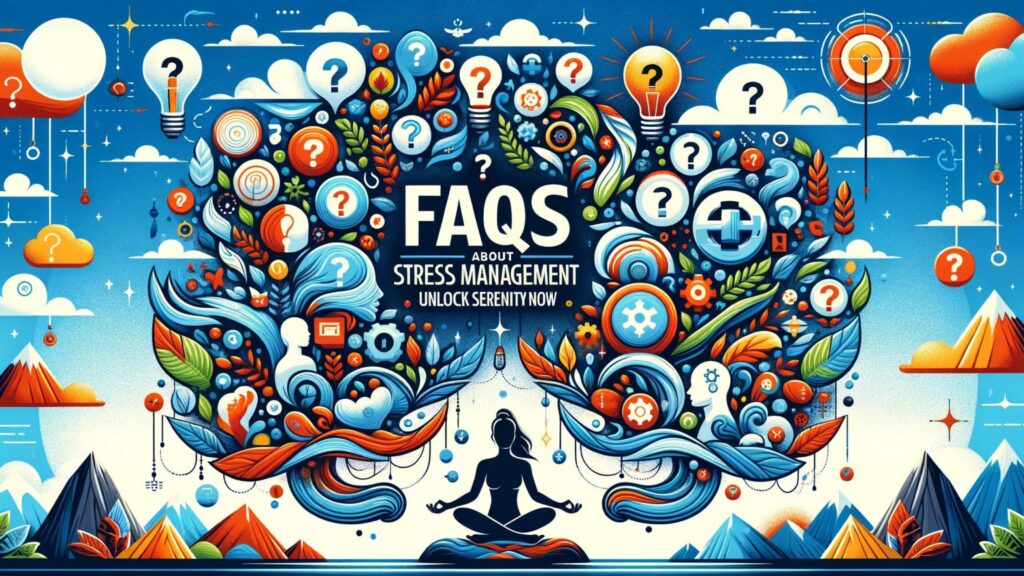In the tumultuous sea of daily life, where tempests of tasks and squalls of stress constantly besiege us, the art of stress management basics and the quest to unlock serenity shine as beacons of hope. This odyssey requires more than just navigation skills; it necessitates a compass forged from spiritual resilience and mindfulness. In the midst of the cacophony of life’s relentless demands, we reveal the sanctum of tranquility. Serenity is not just a whispered myth but a tangible reality that awaits your embrace in this haven.
- The Modern Quest for Peace: Understanding Stress Management Fundamentals
- The Journey Begins: Unlock Serenity
- What is "stress"? A deep dive into its mechanisms
- The Pillars of Stress Management Basics
- Self-awareness can help you achieve serenity
- "The Science of Stress and its Effect on Your Health"
- Historical Approaches to Stress Relief: Learning from the Past
- Stress and emotional intelligence
- The Effect of Social Media on Stress
- Daily habits to promote stress management
- Mindfulness Meditation: A Path to Finding Serenity
- The role of physical activity in alleviating stress
- Nutrition and Stress: What to Eat for Serenity
- Sleep is essential for stress management
- Time management techniques to reduce stress
- Declutter your space and mind
- Exploring aromatherapy and essential oils
- The benefits of deep breathing exercises
- Yoga and Tai Chi: Ancient Practices for Modern Stress
- Biofeedback and neurofeedback: technology meets serenity
- Cognitive Behavior Therapy and Stress Management
- Nature and green spaces as stress relievers
- Evaluating your stress triggers and responses
- Build Your Personal Stress Management Basics Toolkit
- Setting realistic goals to unlock serenity
- The Value of Routine in Stress Reduction
- Monitoring Progress: Keeping Stress at Bay
- Stress and the gut-brain axis
- The impact of creativity on stress management is significant
- Fundamentals of Stress Management: Identifying and Overcoming Barriers
- Dealing with Setbacks: Strategies for Staying on Track
- The role of support systems is crucial in stress management
- Managing stress in high-pressure environments
- Unlock serenity in difficult times
- Financial stress management techniques
- Stress Management for Different Age Groups
- Cultural differences in stress perception and management
- Cultivating a Mindset For Long-Term Serenity
- The impact of stress management on relationships is significant
- Teaching others the basics of stress management
- The Future of Stress Management: Emerging Trends
- Living a Serene Life: The Ultimate Achievement
- The importance of laughter and humor
- Volunteer work to alleviate stress
- The effects of music and sound therapy are significant
- Stress management in the workplace
- Stress management strategies
The Modern Quest for Peace: Understanding Stress Management Fundamentals
The quest for peace in a turbulent world begins with a basic understanding of stress management principles. The recognition that stress is unavoidable yet manageable through strategies that lessen its impact forms this foundation. Investigating stress mechanisms can equip individuals with the tools they need to foster resilience and serenity in the midst of life’s storms.
The Journey Begins: Unlock Serenity
To achieve serenity is to embark on a journey that goes beyond the surface and into the depths of one’s being. An intentional shift toward self-awareness marks this journey, with each step leading to a better understanding and harmony of one’s internal state with the external world. It is a journey that promises more than just peace but also a profound spiritual transformation.

The Foundations of Stress Management
What is “stress”? A deep dive into its mechanisms
Stress, an unwelcome companion in our daily lives, operates through complex mechanisms that affect both our physical and psychological well-being. Understanding these mechanisms is the first step toward managing stress. It reveals how our bodies and minds respond to external pressures and emphasizes the importance of developing coping strategies that can lead to a peaceful state of being.
The Pillars of Stress Management Basics
The principles of awareness, acceptance, and action serve as the foundation for stress management strategies. These fundamentals serve as the foundation for developing a resilient mindset capable of confronting stress with calm. Through these pillars, people learn to navigate their inner landscapes, transforming stress from a formidable foe into a manageable part of life.
Self-awareness can help you achieve serenity
Self-awareness is the key that opens the door to serenity. It entails an introspective journey in which one learns to observe thoughts and emotions without bias. Self-reflection is essential for identifying stressors and developing personalized stress management strategies. True mastery of the art of serenity begins with self-awareness.
“The Science of Stress and its Effect on Your Health”
The science of stress reveals the profound effects it has on our health, from disrupting sleep patterns to compromising our immune system. Understanding the physiological responses triggered by stress allows us to recognize the importance of using effective stress management techniques. These techniques not only reduce the immediate effects of stress but also protect our long-term health and well-being.
Historical Approaches to Stress Relief: Learning from the Past
Historical approaches to stress relief, ranging from ancient meditation practices to traditional herbal remedies, provide timeless wisdom in the art of relaxation. These practices highlight humanity’s universal desire for peace, as well as the various strategies it has used to achieve it. Exploring these historical approaches allows us to learn valuable lessons that are still relevant in today’s fast-paced world.
Stress and emotional intelligence
Emotional intelligence is essential for stress management because it allows people to recognize, understand, and regulate their emotions. By developing emotional intelligence, you can navigate stressful situations with greater ease and resilience, turning potential triggers into opportunities for growth and self-discovery.
The Effect of Social Media on Stress
Social media permeates every aspect of our lives, making its impact on stress impossible to overstate. Navigating the complex web of social connections and information overload can exacerbate stress, so it is critical to set healthy boundaries. By consciously regulating our social media consumption, we can reduce the stress it causes and reclaim our mental space.

Practical Strategies for Managing Stress
Daily habits to promote stress management
Developing daily habits that align with stress management fundamentals is critical for maintaining a calm state of mind. These habits, ranging from morning meditation to evening gratitude practices, form a framework that promotes mental and emotional well-being. By prioritizing these habits, we lay the groundwork for a peaceful and resilient existence.
Mindfulness Meditation: A Path to Finding Serenity
Mindfulness Meditation is a powerful tool for achieving serenity because it trains the mind to be present in the moment. This practice relieves stress by breaking free from habitual patterns of rumination and worry. Mindfulness can help people cultivate a state of calm awareness, allowing them to face life’s challenges with a centered and peaceful spirit.
The role of physical activity in alleviating stress
Physical activity is an important part of stress management because it promotes the release of endorphins, the body’s natural mood elevators. Regular exercise, such as a brisk walk or a yoga session, can significantly reduce stress and improve overall well-being. By incorporating physical activity into our daily routines, we can harness its therapeutic benefits to combat stress and achieve serenity.
Nutrition and Stress: What to Eat for Serenity
Nutrition is essential in stress management because the foods we eat can either exacerbate or relieve stress. A diet high in whole foods, such as fruits, vegetables, and whole grains, contains the nutrients required to combat stress. We can nourish our bodies and minds by intentionally choosing foods that promote mental health, paving the way to serenity.
Sleep is essential for stress management
Sleep is essential for stress management because it allows our bodies and minds to relax, recover, and regenerate. Getting enough and good sleep is critical for staying balanced and resilient in the face of stress. Adopting healthy sleep habits can help us improve our stress response and overall quality of life.
Time management techniques to reduce stress
Effective time management is beneficial for reducing stress because it relieves the pressure of hectic schedules and deadlines. By prioritizing tasks, setting realistic goals, and allocating time wisely, we can navigate our daily responsibilities with greater ease and less stress. Time management not only boosts productivity, but it also leads to a more relaxed and balanced lifestyle.
Declutter your space and mind
The physical environment in which we live and work has a significant impact on our stress levels. Decluttering our space can lead to a decluttered mind because it eliminates physical distractions and promotes a sense of calm and organization. By embracing minimalism and organizing our surroundings, we can create an environment that promotes stress relief and serenity.

Advanced techniques for deep serenity
Exploring aromatherapy and essential oils
Aromatherapy and essential oils act as gateways to tranquility, their essence permeating the senses and soothing the mind and spirit. This ancient practice uses the power of natural fragrances to balance emotions and reduce stress. Exploring aromatherapy entails understanding the distinct properties of each oil, from calming lavender to uplifting citrus, as well as their synergistic effects on improving mental health. Integrating these natural scents into daily routines can transform ordinary spaces into havens of peace.
The benefits of deep breathing exercises
Deep breathing exercises are the soul’s whisper, a gentle reminder to stop and reset in the midst of life’s chaos. This simple yet profound technique focuses on slowing the breath, which signals the nervous system to relax. Individuals can achieve deep relaxation by consciously inhaling serenity and exhaling stress. Engaging in this practice, accessible at any time and from any location, is crucial for managing stress and attaining inner peace.
Yoga and Tai Chi: Ancient Practices for Modern Stress
Yoga and Tai Chi serve as timeless sentinels, providing respite from the storm of modern stress. These disciplines combine physical postures, breath control, and meditation to achieve bodily and mental harmony. Yoga, with its various asanas, encourages flexibility and strength, whereas Tai Chi’s fluid movements promote balance and calm. Both practices demonstrate ancient cultures’ enduring wisdom for cultivating deep serenity in today’s fast-paced world.
Biofeedback and neurofeedback: technology meets serenity
Biofeedback and neurofeedback emerge as modern pathways to serenity at the intersection of technology and wellness. These innovative techniques provide individuals with the tools they need to understand and control their physiological responses to stress. People can actively participate in their journey toward stress management by monitoring their body’s signals, from heart rate to brain waves, and employing exercises to control these responses, resulting in a state of calm that resonates deep within them.
Cognitive Behavior Therapy and Stress Management
Cognitive-behavioral therapy (CBT) serves as a beacon of hope for those navigating the turbulent waters of stress. This therapeutic approach addresses the interconnected nature of thoughts, emotions, and behaviors, providing strategies for breaking down negative patterns that exacerbate stress. CBT teaches people how to reframe their perceptions, resulting in a more balanced and positive outlook that leads to profound serenity and better mental health.
Nature and green spaces as stress relievers
Immersing oneself in nature and green spaces is like returning home to a place where the soul can breathe freely, free of the constraints of urban life. The natural world, with its boundless beauty and tranquility, is a powerful stress reliever. Studies have shown that spending time in nature not only reduces stress but also improves physical and emotional well-being, reaffirming the environment’s critical role in cultivating deep serenity.

Tailoring Your Stress Management Plan
Evaluating your stress triggers and responses
The first step in developing a personalized stress management plan is to become deeply aware of oneself. Identifying stressors and understanding individual responses are critical for developing effective coping mechanisms. This introspective journey assists individuals in identifying the subtleties of their stressors and establishing a customized stress management strategy based on their unique experiences and requirements.
Build Your Personal Stress Management Basics Toolkit
Creating a personal stress management toolkit is similar to putting together a mosaic of resilience, with each piece representing a strategy or practice that contributes to overall well-being. This toolkit may include mindfulness exercises, physical activities, creative outlets, and relaxation techniques. Individuals can empower themselves by curating a collection of resources that they can turn to in times of stress.
Setting realistic goals to unlock serenity
The achievement of realistic and attainable goals marks the journey to serenity. Setting such goals promotes progress while removing the burden of perfectionism and unrealistic expectations. Whether they relate to daily mindfulness practice, regular physical activity, or the development of positive relationships, these goals serve as guiding stars on the path to stress management and inner peace.
The Value of Routine in Stress Reduction
Establishing a routine that incorporates stress-reduction practices provides a framework for consistency and stability amidst life’s unpredictable tides. This routine can serve as a framework for mental health, providing regular opportunities for self-care and mindfulness. The rhythmic nature of a well-crafted routine helps to dispel chaos, fostering a sense of control and predictability that is essential for stress reduction and serenity enhancement.
Monitoring Progress: Keeping Stress at Bay
Tracking progress in stress management is a reflective practice that highlights the journey’s highs and lows. By regularly assessing their emotional and mental landscape, individuals can determine which strategies are most effective for them and where adjustments are necessary. This ongoing evaluation ensures that the stress management strategy remains dynamic and adaptable to changing needs and circumstances.
Stress and the gut-brain axis
The intricate dance between the gut and the brain is critical to stress management, demonstrating the interconnectedness of physical and mental health. Emerging research on the gut-brain axis reveals how gut health influences mood and stress levels, implying that dietary choices and probiotics could be effective tools for improving emotional well-being. Nurturing the gut-brain connection provides a holistic approach to stress management in which physical nourishment directly supports mental tranquility.
The impact of creativity on stress management is significant
Creativity emerges as a vibrant thread in the stress management tapestry, providing a unique avenue for self-expression and exploration. Painting, writing, music, and dance are all examples of creative activities that can act as stress relievers by channeling emotions into art. This process not only brings a sense of accomplishment and joy, but it also promotes mindfulness and reduces stress, demonstrating the transformative power of creativity in cultivating serenity.

Overcoming Barriers to Serenity
Fundamentals of Stress Management: Identifying and Overcoming Barriers
Invisible barriers, both internal and external, frequently impede the journey to stress management. Identifying these barriers is the first step toward overcoming them. Common barriers include a lack of awareness about stress triggers, insufficient time for self-care, and societal stigma associated with mental health. To overcome these barriers, a multifaceted approach is required, including increasing self-awareness through reflection and journaling, prioritizing self-care in daily routines, and cultivating an open and judgment-free culture that supports mental health.
Dealing with Setbacks: Strategies for Staying on Track
Setbacks in stress management are not failures but rather opportunities for learning and improvement. The key to resilience is to develop effective strategies for dealing with these challenges. Breaking down goals into manageable tasks, seeking feedback to better understand the setbacks, and practicing self-compassion can all help turn setbacks into stepping stones to serenity.
The role of support systems is crucial in stress management
Stress management relies heavily on support systems, which provide emotional, psychological, and sometimes physical support. This network, whether made up of family, friends, or professionals, provides a safety net during difficult times. Cultivating strong relationships and actively seeking help when needed can significantly reduce the effects of stress.
Managing stress in high-pressure environments
High-pressure environments, defined by tight deadlines and high stakes, necessitate specialized stress management techniques. Proactive planning, clear boundaries, and short, focused breaks to rejuvenate are all effective strategies. Mindfulness and breathing exercises can also help you stay calm and focused under pressure.
Unlock serenity in difficult times
Difficult times test our resilience and ability to remain calm. During such times, focusing on controllable aspects of life, practicing gratitude, and participating in activities that promote peace are critical. Remember that serenity is not the absence of stress but the ability to live in peace amidst it.
Financial stress management techniques
Financial stress is a common cause of anxiety. Management techniques include developing a clear financial plan, establishing realistic budgets, and seeking professional advice as needed. Mindfulness practices can also help to reduce the emotional impact of financial worries, allowing you to maintain a more balanced perspective.
Stress Management for Different Age Groups
Stress affects each age group differently, necessitating individualized management strategies. For children, playful activities and open communication are essential. Adolescents benefit from autonomy and emotional regulation abilities, whereas adults may require strategies that combine work-life balance and self-care. Elderly people frequently find peace in social connections and legacy-building activities.
Cultural differences in stress perception and management
Cultural backgrounds have a significant impact on how people perceive and manage stress. Recognizing these differences is critical to creating inclusive and effective stress management programs. Integrating cultural practices, beliefs, and values into stress management can improve its efficacy and acceptability among diverse populations.

Beyond the Basics: A Life of Serenity
Cultivating a Mindset For Long-Term Serenity
A mindset that prioritizes acceptance, resilience, and adaptability leads to long-term serenity. Cultivating this mindset entails regular reflection, meditation, and the deliberate decision to face life’s challenges with grace rather than resistance. This foundation promotes a sustained sense of peace and well-being.
The impact of stress management on relationships is significant
Effective stress management benefits both the individual and their relationships. Individuals who reduce their personal stress become more present, empathetic, and responsive to their partners, friends, and family. This positive shift has the potential to transform relationships by fostering stronger connections and mutual support.
Teaching others the basics of stress management
Sharing stress-management techniques with others is an effective way to increase serenity. Whether through formal education, workshops, or casual conversations, teaching these practices broadens the teacher’s understanding and empowers others to manage their stress. This ripple effect can have a significant impact on community well-being.
The Future of Stress Management: Emerging Trends
The future of stress management appears bright, with new trends emphasizing personalized approaches, technology integration, and holistic wellness. AI-powered mindfulness apps, wearable stress monitors, and integrative health plans are among the innovations that are making stress management more accessible and effective.
Living a Serene Life: The Ultimate Achievement
Living a serene life is the result of a consistent effort to manage stress and cultivate peace. The mastery of navigating life with calm distinguishes this achievement, not the absence of challenges. A serene life is full of joy, deep connections, and personal fulfillment.
The importance of laughter and humor
Laughter and humor are powerful antidotes to stress, capable of instantly lifting spirits and increasing resilience. Adding laughter to your daily routine, whether through comedy, playful interactions, or simply not taking life too seriously, can significantly reduce stress and improve overall well-being.
Volunteer work to alleviate stress
Volunteering provides a unique way to reduce stress by providing a sense of purpose, a connection to the community, and a new perspective. Giving back promotes positive emotions and reduces feelings of isolation, emphasizing the link between personal well-being and community health.
The effects of music and sound therapy are significant
Music and sound therapy both use the transformative power of sound to relax the mind and body. Listening to calming music, taking sound baths, or playing therapeutic instruments can all help to reduce stress and promote deep relaxation.
Stress management in the workplace
Stress management in the workplace is critical for individual health and organizational success. Employers can help employees manage stress by implementing policies that promote work-life balance, provide mental health resources, and foster a supportive work environment. These efforts benefit not only employee well-being but also productivity and job satisfaction.
Stress management strategies
Stress prevention measures include proactive strategies for reducing the likelihood of stress accumulation. Regular exercise, healthy eating, adequate sleep, and mindfulness practices are essential components. Furthermore, maintaining strong social connections and engaging in hobbies can act as effective stress relievers.

A professional step-by-step guide to stress management
Many people in today’s fast-paced world experience constant stress. However, stress management is more than just coping; it is about thriving. This guide, “Unlock Serenity Now,” provides a step-by-step process for transforming stress into strength and serenity.
Step one: recognize your stress triggers.
Identify: Keep a journal for one week and record when you feel stressed. Look for patterns.
Analyze: Determine whether these stressors are under your control. If not, think about how you can respond to them differently.
Step 2: Implement daily mindfulness practices.
Meditation: Begin by focusing on your breathing for 5 minutes per day.
Mindful Walking: Take a 10-minute walk while fully aware of each step and your surroundings.
Step 3: Create a Routine for Physical Activity
Exercise Plan: Include at least 30 minutes of moderate exercise in your daily routine.
Choose activities that you enjoy, such as brisk walking, yoga, or cycling, to keep your motivation up.
Step 4: Improve your sleep hygiene.
Consistency: Go to bed and wake up at the same time every day, including weekends.
Environment: Make sure your sleeping environment is cool, dark, and quiet.
Step 5: Develop healthy eating habits.
Balanced Diet: Eat vegetables, fruits, whole grains, and lean proteins.
Hydration: Drink plenty of water throughout the day to help reduce stress.
Step 6: Foster positive relationships.
Support Network: Invest time in relationships that offer encouragement and positivity.
Communication: Learn to express your feelings and needs in an open and constructive manner.
Step 7: Establish realistic goals and priorities.
Goal Setting: Break your goals down into manageable steps and establish priorities to focus on what is truly important.
To reduce overwhelm, delegate tasks whenever possible.
Step 8: Practice gratitude.
Gratitude Journal: Every night, write three things you are grateful for.
Reflection: Consider how these positive aspects affect your life and well-being.
Step 9: Seek professional help as needed.
If stress becomes overwhelming or persistent, consider seeking therapy or counseling.
Attend stress management workshops or seminars to gain additional strategies and support.
Stress management It’s the path to a balanced and fulfilling life. By incorporating these steps into your daily routine, you will not only effectively manage stress but also experience a greater sense of peace and well-being. Begin your journey to serenity today and change how you perceive the world around you.

FAQs about stress management: Unlock serenity now
1. Define stress management.
Stress management entails implementing strategies and techniques to control and reduce stress in your life, thereby improving your overall well-being.
2. How can I identify my stressors?
To identify stress triggers, keep a stress journal where you record when you feel stressed and the circumstances surrounding it.
3. What are the advantages of managing stress?
Benefits include improved mental health, increased productivity, better physical health, and a higher quality of life.
4. Does exercise really help to reduce stress?
Yes, exercise produces endorphins, which are natural stress relievers and mood enhancers.
5. How does diet impact stress management?
A well-balanced diet can increase your energy, improve your sleep, and alleviate stress symptoms by stabilizing blood sugar levels.
6. How important is sleep for stress management?
Sleep is essential because it allows your body and mind to recharge, increasing your ability to cope with stress.
7. Are there any immediate ways to relieve stress?
Yes, methods such as deep breathing, progressive muscle relaxation, and visualization can provide immediate relief.
8. How do mindfulness and meditation help with stress management?
Mindfulness and meditation help by directing your attention to the present moment, reducing overthinking and anxiety.
9. What’s the distinction between good and bad stress?
Good stress (eustress) motivates and improves performance, whereas bad stress (distress) can overwhelm and reduce performance.
10. Can stress management techniques differ between people?
Yes, people respond differently to stress, and some techniques are more effective than others.
11. How do I make a stress management plan?
Begin by identifying stressors, setting realistic goals, implementing stress-reduction techniques, and making adjustments as needed.
12. How does social support influence stress management?
Strong social support can offer emotional comfort, practical assistance, and alleviate feelings of isolation and stress.
13. What are the signs that I should seek professional help for stress?
Signs include persistent anxiety, depression, physical health issues, or stress interfering with daily life.
14. How can I deal with stress in the workplace?
Manage workplace stress by prioritizing tasks, taking regular breaks, and seeking assistance from coworkers or a manager.
15. Does stress have a long-term impact on health?
Yes, chronic stress can cause serious health problems such as heart disease, depression, and a compromised immune system.
16. What are some stress-management techniques for kids?
Techniques include encouraging expression through speech or play, establishing routines, and teaching basic breathing exercises.
17. How can I teach others about stress management?
Educate people about stress and its effects; demonstrate techniques; and provide resources such as books or websites.
18. Are there any digital tools or apps for stress management?
Many apps provide guided meditations, breathing exercises, and stress-management tracking tools.
19. How can time management help you reduce stress?
Effective time management can help you avoid feeling overwhelmed by creating a more balanced and stress-free schedule.
20. What should be my first step if I feel overwhelmed by stress?
The first step is to pause and take a few deep breaths, then identify which tasks or thoughts are causing stress and address them one at a time.
Conclusion
Stress management is critical in today’s fast-paced world, serving as the key to living a peaceful life. Mastering effective techniques can significantly improve your well-being and tranquility, making your days more peaceful and productive. Learn more about how to manage stress effectively. Explore our detailed guides and change your life today!

